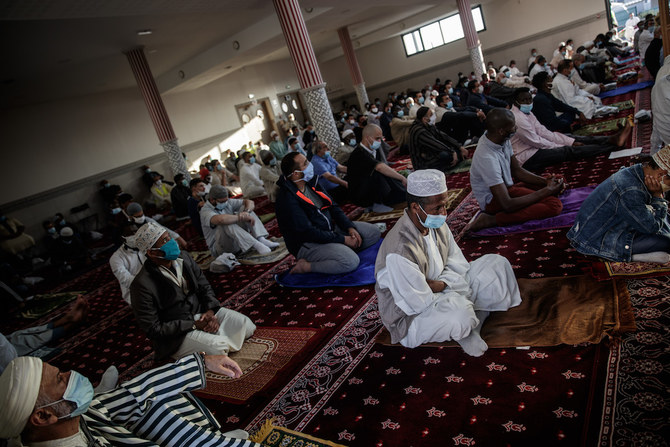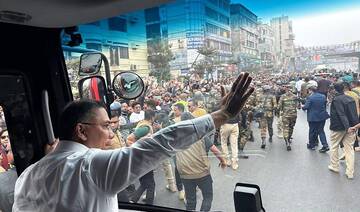PARIS: Violence inspired by radical Islam has created a growing sense of insecurity, fear and Islamophobia in France, which has only fueled the conflation of Islam and Islamism in the public’s consciousness, an Arab News/YouGov poll of French people of Arab origin has found.
On Oct. 29, three people were killed in a stabbing attack near the Notre-Dame basilica in the southern French city of Nice. It followed the beheading of a French school teacher near Paris on Oct. 16, who had used caricatures of the Prophet Mohammed in a lesson about freedom of expression.
The attacks have led to a sharpening of rhetoric, both domestically and on the world stage, which has brought France’s core value of secularism under the spotlight and raised the spectre of cultural conflict.
“It is clear that terrorism is also an act of communication. Added to the barbarity of the modus operandi is a desire to accelerate the break up the society in order to start a war of religion by accrediting the thesis that the Republic persecutes its Muslim citizens,” David Djaiz, an essayist and professor at the prestigious Paris Institute of Political Studies (Sciences Po), told Arab News.
Djaiz believes this is due in part to a mistranslation of French society’s values of secularism. But he is also aware of some deliberate distortions used to serve political ends.
“President Emmanuel Macron spoke of ‘Islamism’ but his words were translated into Arabic using the word ‘Islam,’” Djaiz said, referring to the French president’s remarks in response to the beaheading of teacher Samuel Paty.
As a result, some foreign politicians used these distorted words to sow confusion and to trigger protests and boycotts of French goods, he said.
“Turkish President Recep Tayyip Erdogan, for example, has used this discourse in a very cynical way to satisfy his own political agenda,” Djaiz said.
The climate this has created in the wake of the Paris and Nice attacks has only served the interests of jihadist terrorism, which seeks to alienate French Muslims from the rest of the society, he added.
The solution may be multi-pronged. Beyond police and judicial operations to break up Islamist networks, Djaiz wants to see France adopt policies to promote civic friendship and the recognition of French values.
“Every child in this country, regardless of his denominational affiliation, must receive a positive education in the values of the republic and the principles that structure it, and first and foremost the principle of secularism,” he said.
This principle of secularism was conceived by the great figures of the Third Republic, among whom were Protestants, Freemasons and non-believers, to allow the peaceful coexistence of all denominational components of French society.
For a long time, this society was dominated by the Roman Catholic Church, whose dogma influenced the state. But in a society that was becoming more pluralized and complex, republicans sought to separate church and state and allow a diversity of opinions and beliefs to express themselves peacefully.
“From this point of view, secularism is therefore a principle that must be particularly welcoming to Muslims, because it allows everyone to freely exercise their worship by being protected from the pressures of the group,” said Djaiz. This allows the individual to freely worship or to abandon their faith without consequence.
“Secularism is not at all a revolver pointed at Islam as the Anglo-Saxon media alleges. On the contrary, secularism helps to protect all religious convictions,” said Djaiz.
But is secularism actually working in reality? Djaiz believes the problem is a widespread misunderstanding of what it means. “This principle must be explained to young children and this task must be entrusted essentially to teachers and all front-line officials in this country,” he said.
“This pedagogy and explanation work has not been sufficiently done, allowing secularism to be considered as an aggressiveness towards Islam whereas this is totally false,” he said.
“But if we are still debating secularism today, a principle that should have been validated for several decades, it is because the republic indulged itself in laxity and laissez-faire and that the Muslims did not grasp this fight.”
Reaffirming the value of secularism must be made a priority, says Djaiz. To do this, a positive political project promoting the concept of civic friendship is essential.
“This political project must go beyond our particularisms and cannot be limited to the values of the republic,” he said. “We need a project that propels us and tells a new French story that remains largely to be invented.”
The importance of this “new narrative” is clearly spelled out in the findings of the Arab News en Francais/YouGov survey, which has uncovered a generational gap. A majority of young French people of Arab origin are much less enthusiastic about French institutions than their older counterparts.
According to the poll, younger people appear more keen on returning to the roots and origins of their parents and are less inclined to comply with French regulations.
Djaiz believes Muslim scholars and cultural leaders must play their part in undermining the more extreme interpretations of Islam and promoting openness. The views of French Muslims who condemn the protests and boycotts of French goods must also be promoted.
He is optimistic a new social contract can be established that will mend the worrisome rifts opening up in French society.
“We are now on the cusp of very great changes,” he said. “The challenge we are facing today is to establish a kind of new social contract in which every child of the republic will have a place so that no one is tempted by extremist and murderous ideologies.”
















